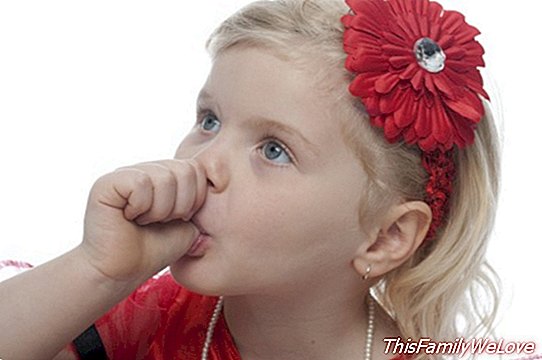Learning to behave well: practical tricks for common situations
In most families, the struggle for good manners is a constant. Learning to behave well is a complicated task for children, who go through an education in which rules and limits must be established, and of course, apply some practical tricks for common situations when you paint them on the walls, eat your nails , they wake up in a bad mood or do not even want to see the toothbrush.
It seems as if the children were born feral and had a hard time correcting certain common situations. Some people do not want to bathe. Others, on the other hand, spend their lives jumping on their bed and do not pick up their room ...
7 practical tricks for children to behave well
"Carlota, please sit down, please do not put your feet on the table! ... And you, Miguel, use the fork and not the hands!" Are these phrases familiar?
Good manners have a purpose. They make human relationships more pleasant, while helping to coexist. The problem is usually that children do not understand in good manners and almost all of them find it difficult to adapt to certain standards of education.
Sometimes, to strengthen the opposite virtue is enough, but many times there are some tricks to put into practice the shortcoming as soon as possible.
1. Do not paint on the walls!
Every time Charlie's parents turn around, he quickly launches himself to paint the walls of his room with one of his creative and original drawings. His mother has explained many times that he should not do it but it seems that Carlitos does not agree with his mother. This morning, a funny pink house appeared on the wall of his room.
To remedy this type of situation it is important that we teach children where they can and can not write. A good system at these ages is to go around the house pointing out the right places and the inappropriate places and, if the child is old enough, explaining why. At the same time, we will have to provide alternatives. This is the key for us to get to modify their behavior.
Children love to write and draw and, for that, It is important that we provide them with drawing material and a space in which they can work to their liking. We will also have to limit the places where the child can work (the kitchen table, a desk, the floor of his room) by emphasizing that these are the only places where he can write.
2. Rebels to the toothbrush
Teeth washing is often the subject of discussion in most households. After three or four years a child can learn to wash teeth with greater or lesser dexterity. To achieve this we can use small tricks as an incentive. For example, we can buy a toilet that is "only yours" where you will keep your brush and toothpaste.
We can also encourage him to choose the best toothpaste in the store (now there are many different flavors). If still, our son resists we can propose a simple game. On a poster we will design a happy tooth graphic. Each time the child brushes his teeth, we draw a star on the graph. When each tooth has its corresponding star below, our child can choose a dessert for the weekend.
3. All day long sucking your finger!

Many children are "suck-fingers" born. The finger finds its way to the mouth in the first months and stays there. This does not mean that the baby feels anxious or insecure but, rather, that the habit satisfies his need to suck.
A fun way to encourage our little one to leave this bad habit is paint a funny face on the finger in question. In this way, each time the child goes to insert the finger in the mouth you will find an amazing face that will remind you not to suck your finger.
4. Morning sickness
Some children get upset in the morning because they are often awakened during the period of deep sleep. Obviously, you can not always delay the time to wake up because school hours do not allow it. A system to tackle this problem is to tell the child that he can be all the grumpy he wants, but that he will only have five minutes to behave like that.
At the time, and as a game, we will try to make all the members of the family act like this. We will set an alarm clock for five minutes while we all complain. When the alarm goes off, we will try to laugh out loud at the situation, moving the black clouds away.
5. The "eat nails"
Of all the nervous habits, the one to eat the nails is the most common and the one that more usually is prolonged in the adolescence or, even, in the adult age if it is not treated.It is estimated that one third of children in primary school and about half of adolescents eat fingernails.
Many children bite, scratch or gnaw their nails when their hands are unoccupied. A smooth stone, a rubber ball, an amulet chosen between the two ... may be the best way to entertain yourself in those times when you usually bite your nails. We can also use positive motivations. For example, if it is one of our daughters we can surprise her with some fantasy gloves or rings. If it's a child, we can give it to him paintings to draw with fingers or toys like finger puppets, as a reward for not biting your nails.
6. Always with dirty face and hands

A clean child is a jewel, but we must try to be reasonable in terms of cleanliness at these ages. Young children often try to wash themselves, but most do not get to clean their hands properly without supervision until they are four years old.
Wash your face properly without help usually do it at four and a half years.To help you in this task we will put in the bathroom a sturdy stool with your name so that he can get up and wash properly. Previously we will have bought a liquid soap that does not irritate the eyes. In this way, each time the child goes to wash, he can play and smear his face with liquid soap without itching his eyes.
7. The chaos of not picking
Children often do not acquire the habit of picking up their clothes if someone does it for them. Therefore, it is convenient that since they are small they get used to doing things by themselves as soon as possible. A two-year-old child, for example, can put the socks together, order the folded underwear and tell what piece of clothing belongs to each member of the family.
To encourage him to be more orderly we can tell him to make a train with his shoes in the closet while he orders them. We can also encourage you to decorate the boxes of shoes cut to serve as dividers in the drawers. It is good that we let him decide which is the drawer he prefers for socks, underwear or shorts.
Tips to teach children to behave well
1. Children love hearing stories. A good way to correct a defectillo is inventing a story in which the protagonist has the courage to overcome their bad habits.
2. Children need clear rules from the first day. We can not pretend that they are well-educated children if, at times, we succumb to their whims because of fatigue.
3. The family environment it is a fundamental factor in the education of the children. We must try to create an atmosphere of happiness at home. Thus, we will be collaborating so that our son becomes a serene and balanced adult.
4. When correcting small defects, everything does not have to be scolding. Sometimes, it takes only a little imagination to tackle these minor problems.
We have all been small and we have had certain bad habits. It is important to take this opportunity to set ourselves as an example of overcoming our children. The tricks that we used when we were children will help them to eliminate those defects.
Irene Gutiérrez
Source: "Be good". Practical solutions for common problems. Stephen Garber, Marianne Garber, Robyn Spizman. Medici editions.




